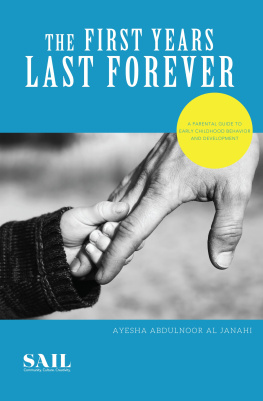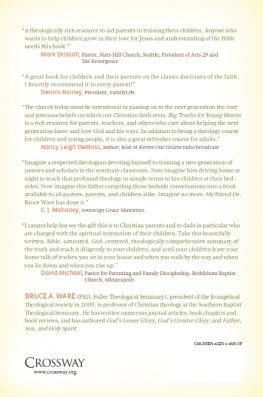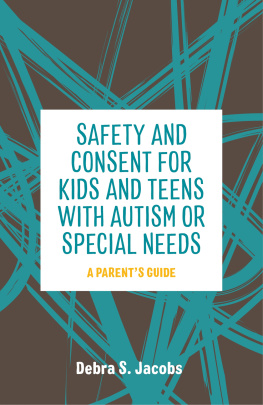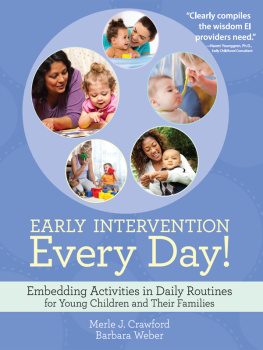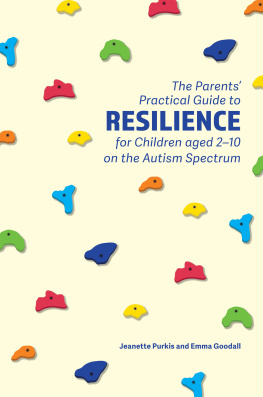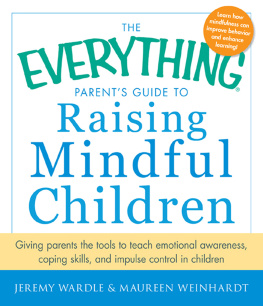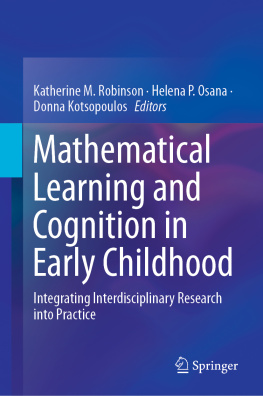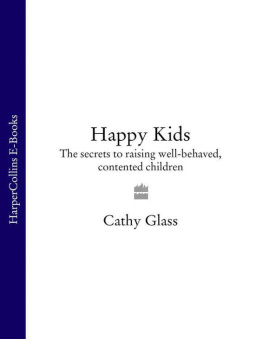
The First Years Last Forever
A parental guide to early childhood behavior and development
Ayesha Abdulnoor Al Janahi
Published by Sail Publishing L.L.C.
First published in 2017
Copyright 2017 by Sail Publishing L.L.C.
All rights reserved. This book or any portion thereof may not be reproduced or used in any manner whatsoever without the express written permission of the publisher except for the use of brief quotations in a book review.

Email:
Facebook: facebook.com/SailEMagazine
Instagram: @SailPublishing
Twitter: @SailPublishing
Youtube: Sail Pubishing and Sail Magazine
Introduction
In this parenting book, the author examines the behavior of young children in a developmental context, and takes into consideration the changes as young children grow and develop. The book will show parents and caregivers ways to deal with the children in the various stages of their life, starting from the nursery, where there is anxiety and fear associated with his or her separation from a parent or other significant person. It will also help parents with their childrens learning difficulties and disorders, to help their kids grow to reach their full potential. The book will also highlight the important issue of child abuse and how to come up with a family safety plan that includes pre-planned discussions and spontaneous opportunities to teach awareness to children.
Raising children in their early years is not exactly an easy process; it has many ups, downs, and confusions, but those early years are essential in shaping the personality of the child. During this phase, parents need to be aware of the development al phases their children go through , from being infants, toddlers, preschoolers, grade-schoolers, teens, all the way to being young adults.
The First Years Last Forever is a guide to support parents and caregivers to better understand child ren s behavior and psychology, and develop healthy relationship s and interactions with them from their early years. All the chapters in this book are supported by research, to ensure parents and caregivers are benefitted with examples and evidence, which will help them in the journey of raising their child.
Written in collaboration with Arabian Child organization ( www.arabianchild.org )
Table of Contents
Discipline in Early Years

Figure - Artwork by Dubai Abuhoul
Never regret anything that has happened in your life. It cannot be changed, undone or forgotten, so take it as a lesson learned and move on.
As a parent of a young child, you know how difficult it is to deal with challenging behavior and perhaps you have often said my son screams in public when he does not get his way, my daughter whines and cries at mealtimes, or my two children are always fighting. So what are effective disciplining strategies that we can use with our children that will help them achieve self-control and will ease their challenging behavior?
Sometimes our first reaction to their wrongdoing is a harsh NO. Other times, we lose our temper and snap back at them pointing and waving our finger and warning them, or putting them in timeout. However, researchers found that these harsh disciplining techniques may succeed in the short-term, with a sudden halt of their actions, but in the long term, they fail to help children grow or react any differently in the future. Not all children are the same. Some are more temperamentally difficult than others, but often, our reactions as parents can encourage their challenging behavior.
When my 18-month old son accidentally stuck a small piece of paper in his nose, my instant reaction could have been to scold him and tell him how wrong his actions were. But how effective would harsh discipline be at that critical moment? Anger brings about fear and stops the bad behavior for a short time, but in the long run, it will not teach my son about taking care of his body, or that nostrils are for smelling and not for storing paper.
During the first six years of life, your child is learning to develop self-control. This is the ability to manage his or her actions, feelings, and relationships with others including friends and siblings. These early years are critical to their development and whatever they experience in their early years will have an effect on their brains architecture and their future successes in life.
So here are three strategies you can use to strengthen your childs self-control skills and help you deal with challenging behavior.
First , use words to help your child understand their feelings. When your child is screaming because you did not buy them the toy they wanted at the shop, say you feel mad because we did not buy the toy. If they feel their feelings are acknowledged, they will feel respected and will start to calm down.
Second , involve your children in the process and give simple choices. For example, like many mothers, I struggled during mealtimes. My son gave me such a hard time. I wanted to resolve the problem so badly, but my added negative attention only magnified the problem more and more. I gave him a time-out for not eating, yelled, and got angry. But what did he learn? To eat quietly without whining? To follow my instructions? Well, he learned neither. I later realized that refusing to eat was common among all children at this stage because they are starting to learn the concept of control.
Instead of compelling him to follow my instructions, I started to change meal-battle-time into meal-fun-time with mommy. He helped me set the table and I let him choose his favorite plate and cup. Then he helped me prepare the food, choosing between carrots and cucumbers. This process of involvement and simple choices had a magical effect on mealtime battles. Involving children in decision-making is important to build their self-esteem. Simple choices like what to wear, what to play with or which story to read has such a wonderful effect on their self-confidence that they will end up naturally wanting to cooperate.
Third , stay calm when your child is upset. If you keep your cool, even when your child drops the vase on the floor or hits their sibling, they will feel safe and start to learn by example. But if you use violence or severe punishment to solve problems, then your child will reciprocate and do the same to their friends or family. Teach children that violence is not OK and the best way to do that is by not doing it to them. Moreover, if you can maintain self-control under pressure and be respectable to others who upset you, then they will learn to do the same.
Remember, as a parent, you have the most important and most complex job in the world. Children are not born with how-to manuals, and we all need support and guidance. So go ahead and spoil your children, not with toys and gifts, but with tender love and care. Give them the gift of your time and attention. By that, you will be applying the most effective disciplining strategy.
Get Ready, Get Set, Learn!

Figure - artwork by Mariam ARMS
Starting kindergarten is a huge milestone for your child and you. Many parents worry about whether their child is ready to learn all the new skills and adapt to a new environment. Being separated from parents, playing with a new group of children, a new classroom environment, sharing and getting along with others is challenging for many children. However, there are some ways to prepare your child before they enter kindergarten. There is the academic approach of focusing on learning the different colors, numbers, and the alphabet. However, a more holistic approach can be taken on social and emotional development.
Next page
